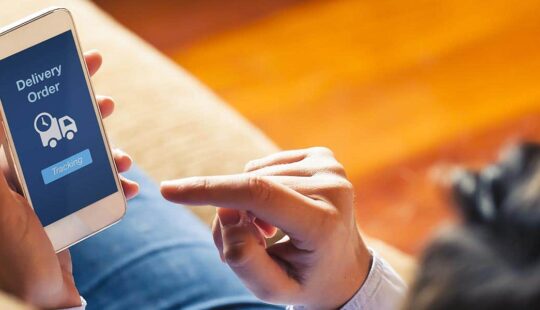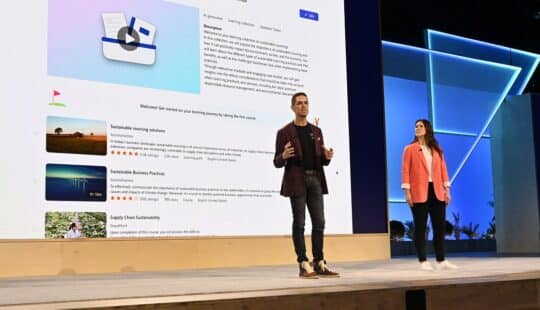As host of the popular podcast Armchair Expert, Dax Shepard loves talking to exciting human beings, and earlier this month at SAP Sapphire Orlando, he was onstage to chat with two who are passionate about sustainability: adidas CIO Andreas Hubert and Kate Hudson, award-winning actress, author, and entrepreneur.
Changing Lives
The adidas sustainability story is quite well known. As Hubert pointed out during the chat, the company’s mission is to be the best sports brand in the world. “Our core belief is that sports have the power to change lives,” he said. “Sports drive culture, along with arts and entertainment, and can be a great entry point for thinking differently.”
adidas is a company that understood early on that experience is the new currency. Even more than buying new stuff, every human wants and needs intangible things such as recognition, inspiration, purpose, and respect. Successful brands and retailers like adidas are able to build value propositions that address deeper, more universal human needs, such as good health, a sense of belonging or contribution to society, and of course having a clean environment for practicing sports and enjoying nature.
Based on SAP software, the company’s Runtastic app creates personalized experiences and motivation for its global fitness community by delivering millions of personalized messages online every day. Rather than just selling shoes, adidas is selling an experience that connects customers to a like-minded community that can motivate them to lead healthier lives.
The philosophy that what is best for the athlete is best for the environment has put adidas in an influential role when it comes to ending plastic waste and creating products with recycled materials. The company was one of the first to unlock a circular future for sports when it launched FUTURECRAFT.LOOP.
“It’s a performance running shoe made to be remade. Instead of ending up in landfill, old shoes are recycled and become part of the next-gen product. We’re even able to leave out the smell,” joked Hubert as he explained the concept to the crowd.
Making It Sustainable
Kate Hudson, Shepard’s next guest, spent a few moments reflecting on the experiences shaping the world around us.
With his family doing all its shopping online during recent years, Shepard’s seven-year-old daughter, for example, had never been in a real store in her young life. “I took her to Target one day, and she was simply awed by the rows and rows of products in the aisles all around. Now she wants to work at a Target so she can be in a real store all day,” he quipped.
Hudson also chatted about her family, including her mother, Goldie Hawn, who helped her to start thinking differently. “Back then, it was the kiss of death for actors to sell any other product but your movie. We’re storytellers,” she said. But the landscape has changed, and endorsements are part of the package.
Hudson decided early on that she would only endorse products she was passionate about. “I’ve always been crazy about working out, mental health, and personal discipline,” she said. “I was active and sporty growing up. It’s all about connecting body and mind.”
From there, it was just a step to founding Fabletics, a global lifestyle brand operating on a membership model with a strong e-commerce business approach. Adding a fashion element to sportswear meant taking a risk. Making it sustainable was even harder, but that was the goal from the get go.
“If you are going to go into business, it has to be for a good reason,” she explained. To have impact, anyone going into business must figure out what the consumers want. Being passionate about eliminating waste, Hudson realized she could facilitate a shift to sustainable fashion.
Fabletics stocks apparel based on analytics of its online trends. Producing directly for the customer eliminates a lot of waste. The company started opening stores to merchandise anything that was leftover. To Hudson’s surprise, the brick-and-mortar side of the business actually started growing. Today Fabletics is a $500 million global company with 75 stores.
“All our orders are carbon neutral,” she said. “Our biggest challenge was sourcing fabric. Finding sustainable polyester fabrics for tights and activewear was really difficult, but as demand grew, our prices became more affordable.”
Hudson concluded that a celebrity-driven company must be extra careful and smart about growth. Small companies may not move the needle like a brand like adidas, but they can be influential by holding true to the mission, staying transparent and authentic, and most all, providing good value through sustainable action. Companies like SAP act as the cornerstone and help move the product, but in our changing world, sustainability is everyone’s responsibility.
“We must all make it our mission,” she said.



